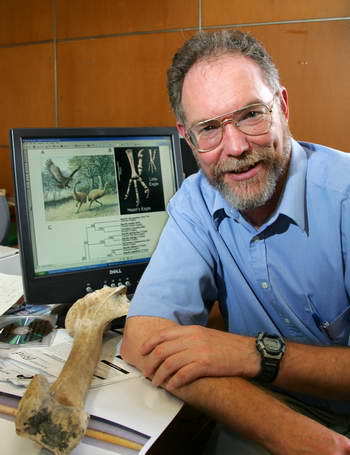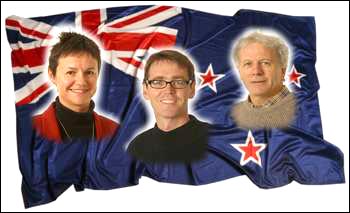Dorothy – 30/07/04
Church going and Sunday observances between 1925 and 1950 continued unchanged for many families in many churches.In Otago and Southland many churches retained the earlier strict ideas and young people’s church activities filled Sunday mornings and afternoons. In some parishes Sunday School was held during the morning church services leaving the afternoon free for family activities.
Religious teaching for children in most Sunday Schools consisted of stories from the Bible sometimes printed in a folder with a picture on the front and the story, activities and questions printed inside. Memory work was important and I remember when I was seven years old being given a passage from Ephesians to learn – putting on the whole armour of God. It was taken from the Authorised version – the King James Bible – and was full of imagery I didn’t really understand, but I enjoyed getting my tongue around what seemed to me “special church words”. Some churches entered their Sunday School students for scripture exams. We never heard any suggestion that the Bible was not the literal word of God. In Protestant churches with overflowing Sunday School classes the younger children were often taught by girls not long out of Sunday School themselves. Weekly training sessions were held to guide them in their teaching.
Two people who attended church in Otago and Southland have described their memories of church going, Sunday School and Bible Class.
Tom recalls church and Sunday School at a Presbyterian church in Dunedin in the 1930s “After time at the morning church service we left to attend the Young Worshippers League during the sermon. Each time we attended we were given a coloured sticker to put in the YWL book. The empty spaces showed when we had missed through the year. If you had a complete record of stamps through the year you got a book prize. I can’t recall what activities we had during that time.
“Sunday School was from 2.30 to 3.30 or 4.00 pm. The format of the Sunday School was that we would meet in the hall for a roll call. I remember on one occasion counting the names and when it was my turn to answer I called out 65, or whatever my count had got to! About a hundred children usually attended. As the offering was taken up we put in our pennies and sang ‘Hear the pennies dropping’ or ‘Pennies from Heaven’.
“The superintendent used to say prayers from the stage, and told us that he always prayed with his eyes firmly shut ‘in case the angels were dancing round in front of his face and he might see them’. Needless to say, many of us watched to see if his eyes really did stay closed! After the prayers there was a Bible reading, then we moved into classes of six to ten for a lesson based on the Bible reading.
“We got book prizes for Sunday School attendance. I was quite amazed when older at the thick books priced at 3s6d or thereabouts, a high price for that time.
“The Senior Sunday School met in the church. It was quite a lurk to be chosen to be the organ pumper, because you could sit hidden behind a curtain for the whole service. On one occasion, the air ran out at the end of one verse and I thought we had come to the end of the hymn.I had to be prompted to carry on pumping so we could complete the hymn.
“Once a year we had what we called a ‘bun fight’ – a special Sunday School tea – and sometimes we had a magician or other entertainer there. Also, once a year there was a Sunday School picnic. For one, I remember we went by tram to a park at Bethunes Gully at the upper end of Normanby. A special feature was the lolly scramble, but I recall that the sweets in those days were not wrapped, as they have to be for lolly scrambles now.”
Jessie grew up in a town in Southland “In the morning we went to the church service which lasted from 11 am to 12.20 or even 12 50. The children’s sermon was about the picture on the Young Worshippers’ League sticker for the day, which Tom has mentioned. If there was a Communion Service the children left church before it began and we walked home together.
I have clear memories of Sunday School, held at two o’clock in the afternoon in the building which functioned as a church and a parish hall.”
“We gathered together at the beginning and there were hymns, and prayers led by the Sunday School superintendent, and occasionally the minister would come and talk to us. It was all very serious. After that we would go into groups for the Sunday School lessons and finally return to the main hall for a dismissal. I clearly remember being in one of the small rooms and feeling pleased when I heard the other children going back into the large hall, which meant we would soon be dismissed.”
“The superintendent – a man who had no children at that time – took his role very seriously. I remember that on one occasion one of the boys wrapped his penny in silver paper. When it was found during the counting of the collection there was a terrible row. Nobody would admit to having done this and the following week the minister came to Sunday School and gave us a lecture about what a terrible thing this was to have done.”
“For the Sunday School prize giving the parents and relatives filled the hall which would hold at least three to four hundred. The prize giving had a feature that was peculiar to our Sunday School. When we went up to receive our books the Pledge was there for us to sign.”
“The Pledge was a promise to refrain from drinking any alcoholic drink. I think that I have signed it three times – but I haven’t adhered to it very well! Most children signing it had little idea what it meant. I know a number of the parents were concerned about this practice, but no one wanted to say anything about it because the minister had such fundamentalist beliefs.”
“I have talked about the teaching of a strict interpretation of the Christian faith and the duties of a Christian, but the serious approach did not spoil our enjoyment of Sunday School. If the morning service took extra long we would have to hurry to be back by two o’clock, but lots of children attended and we would meet and talk as we walked and enjoy the freer atmosphere than prevailed at school during the week. We also enjoyed involvement in the big companies of the Girls’ and Boys’ Brigade, and girls went to the meetings of the Busy Bees where we learnt sewing, knitting and handcrafts and had an annual sale of our products and donated the proceeds to Missions.”
“We loved the Sunday School picnic. We would go by train or bus and picnic in a farmer’s paddock with a stream and trees. It was quite exciting.”
“When we left primary school we went to Bible Class which met at 3 o’clock. We were now old enough to take turns playing the pedal organ for the hymns. I tried to choose hymns that were easy to play and frequently played ‘Fight the good fight’.”
“We played a lot of tennis at the church tennis club. I enjoyed Bible Class picnics and a weekend camp at Punawea in the Catlins and socials where we played games. We were allowed to take part in ‘The Grand Old Duke of York’, but no dancing was permitted. Parish leaders frowned on our attending dances at other Presbyterian churches in the area where less strict ideas prevailed – but we still went!”
“Some of the strict ideas I could not understand or accept. A number of senior high school girls took turns on a Sunday afternoon taking a disabled girl out in her wheelchair to give her parents some free time. When the minister saw me doing this he reprimanded me the following week for missing Bible Class. I still believe I made the right choice.”


